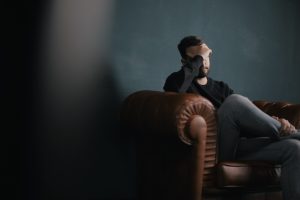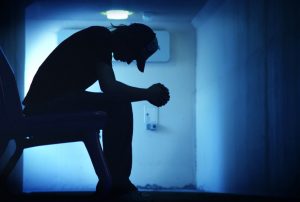Is Food Addiction For Real?
 People often ask, “Is there such a thing as food addiction?” and the answer, for many, is a resounding “Yes!” Experts, dancing on the head of a pin, dismiss overeating as a “behavioral” addiction, much like gambling or Internet use. Substance use disorders are somehow more legitimate, garnering recognition and resources, i.e., insurance coverage. Meanwhile people fighting food addiction struggle to get treatment—that is until they’re obese. And make no mistake: obesity is the outcome of binge eating and food addiction. After decades of diets that don’t work, “treatment” consists of drugs for diabetes, high cholesterol, high blood pressure, arthritis, and increasingly, bariatric surgery.
People often ask, “Is there such a thing as food addiction?” and the answer, for many, is a resounding “Yes!” Experts, dancing on the head of a pin, dismiss overeating as a “behavioral” addiction, much like gambling or Internet use. Substance use disorders are somehow more legitimate, garnering recognition and resources, i.e., insurance coverage. Meanwhile people fighting food addiction struggle to get treatment—that is until they’re obese. And make no mistake: obesity is the outcome of binge eating and food addiction. After decades of diets that don’t work, “treatment” consists of drugs for diabetes, high cholesterol, high blood pressure, arthritis, and increasingly, bariatric surgery.
Medications and surgery, no surprise, are covered by health insurance.
I’ve encountered these head-of-a-pin arguments about food addiction in both clinical settings and family systems; i.e., the heroin addict/recovering alcoholic is taken more seriously (no wine at holiday dinners/no shooting up in the den). Yet cookies and cakes and candies are everywhere. Those of us who’ve battled binge eating disorder (BED) know exactly how this goes: “What’s the matter with you, why don’t you just stop eating?” Our distress is amplified by the disdain we feel from others and the temptation we constantly face. Sloths, slovenly, stupid, sickening… our “gluttony” is proof of our moral turpitude. Ours is the visible addiction—we wear our shame on the outside.
Is Food Addiction Just Another Lazy Excuse?
For many of us food is a substance just like alcohol or drugs: we crave it, we ingest it; we continue to use it despite persistent social or physical problems. We forego activities because we’re ashamed of how we look or maybe we’re disabled, and we continue to overeat, even when it exacerbates underlying psychological issues. Last, but not least, we can’t abstain from food. Every day we must face our “substance” with caution and care. I’d argue that withdrawal criteria does apply when overcoming sugar cravings, and this begs a big fat (unanswered) question: is it really harder to give up drugs or alcohol? We can live full, sustainable lives without drinking or getting high. We can avoid going to the bar—not so the dinner table.
Dr. Gabor Mate, author of In the Realm of Hungry Ghosts, believes the roots of addiction are all the same, neither genetic nor moral, but instead the result of human development gone awry. Any activity can be addictive, he says, from his compulsion for collecting classical music to his patients’ addiction to heroin. Through Mate’s eyes we see his patients as victims of traumatic childhoods, survivors whose unmet needs haunt them as adults. When their emotions become unbearable they get high to free themselves—and however temporarily—they soothe their hungry ghosts.
This description fits the dissociative trance described by binge eaters I’ve assisted, who describe being “in a daze” during and after a binge. Men and women alike say “I don’t know what happened,” or “I woke up in the morning with food wrappers all around me.”
In the Labyrinth of Binge Eating, Hilda Dulin Lee and other women discuss how it feels to binge. “I don’t know,” says one woman. “I guess maybe a sense of relief more than anything.” “It’s more than relief,” says another. “I feel a sense of euphoria.” “The first bite is wonderful,” another says. “I feel soothed and comforted. Anxiety just disappears. Everything is kind of quiet and calm and slowed down.” But then another woman says, “After a while I don’t feel anything, I don’t even taste the food. I just feel numb.” Yes, someone else agrees, “Disconnected. Numb.” “And no pain, either,” someone adds. “I think that void, that disconnection is what I’m after all along. That numbing that bingeing brings.”
Why Would We Eat To Go Numb?
By now many have heard of the ACE Questionnaire but few know it originated in a weight loss clinic. Puzzled as to why his most successful patients were dropping out after losing weight, Dr. Vincent J. Felitti stumbled upon the answer. He accidently asked a patient how much she weighed—he’d meant to ask how old she was—when she first had sexual relations. Her shocking answer was 40 pounds. It was then Dr. Felitti realized that “overeating and obesity were often being used unconsciously as protective solutions to unrecognized problems dating back to childhood.”
Felitti embarked on a mega-study at Kaiser-Permanente in San Diego, analyzing the data of over 17,000 middle-class American adults. In his paper “The Origins of Addiction: Evidence from the Adverse Childhood Experiences Study,” Felitti reported that “three common categories of addiction are strongly related in a proportionate manner to several specific categories of adverse experiences during childhood. This, coupled with related information, suggests that the basic cause of addiction is predominantly experience dependent during childhood and not substance-dependent. This challenge to the usual concept of the cause of addictions has significant implications for medical practice and for treatment programs.”
My own experience with binge eating supports Felitti’s conclusions about the impact of childhood trauma. Between second and third grade my parents moved to a bigger house, changing neighborhoods and schools. Their marriage—afflicted by substance abuse, mental illness and domestic violence—reached a boiling point. Looking back, it’s not surprising that the outgoing seven-year-old I’d been became a lonely, overweight eight-year-old. School wasn’t safe either: I was the new kid, the fat girl, taunted by classmates who gleefully discovered that my last name rhymed with lout, rout, snout, pout, Kraut and stout.
Food was my solace; I was terrified, I was alone.
Soon I began having nightmares where one or the other of my parents killed me. They separated when I was 11, the booze and violence escalated, and I became a pawn in their divorce wars. At 13 I tried the Atkins Diet and binge-restricted my way through high school. When I was 18 my father killed himself; when I was 21 a boyfriend dumped me and I regained 60 pounds. Yet none of these things were addressed when, as a “moderately obese” young woman, I was admitted to a medical weight loss program. I was promptly put on a liquid protein diet (which was made from cows’ hooves as I recall), and left to wrestle my hungry ghosts.
Why couldn’t I stop eating, what was wrong with me? Food was my solace—now food was my nemesis.
Food Addiction and Obesity
Clearly, we need to help people who are overweight or obese in a more comprehensive, compassionate manner. Policymakers and insurers should help patients gain access to physicians, therapists and nutritionists before they become obese. Not all food addicts have endured childhood trauma either. In the 1960s I was an outlier, there weren’t that many fat kids. Nowadays, says Maureen Black, Ph.D., “Kids are getting walloped at every level with cues to eat too much and move too little.” We live in an obesogenic environment, filled with hyperpalatable foods and seductive screens: our kids play virtually while munching mindlessly. One look at the CDC’s Obesity data should convince us all. Obesity-related illnesses are now the nation’s number one public health crisis; we’re literally killing ourselves if we don’t take food addiction seriously.
Resources
http://bedaonline.com/
eatingdisorderscoalition.org/
https://acestoohigh.com/got-your-ace-score/
http://www.nctsn.org/trauma-types/complex-trauma/effects-of-complex-trauma
***
c Laura Hout 2017
Tags: binge eating disorder, childhood trauma, developmental trauma, eating habits, food addiction, negative body image, obesity, overeating, self-image, weight loss2 Comments
Leave a Reply
You must be logged in to post a comment.










I’ve read so many articles like this and while I appreciate the information, where is the help? What can those of us affected with overeating disorders do? Where are the resources? What are the action steps? Where can we turn? Everyone agrees we need to address the issue of obesity but what about addressing the issue of being overweight? Of body shame because of being overweight? Of guilt about eating disorders? Of the actions we can take to change the behaviors of emotional and psychological eating? How to change our thoughts, our actions, our inner voices, our compulsions, our brains? We need help. Not just information.
Please check out “Beyond Overeating” Workshops which were developed specifically for overeaters: https://laurahout.com/beyond-overeating-workshop/